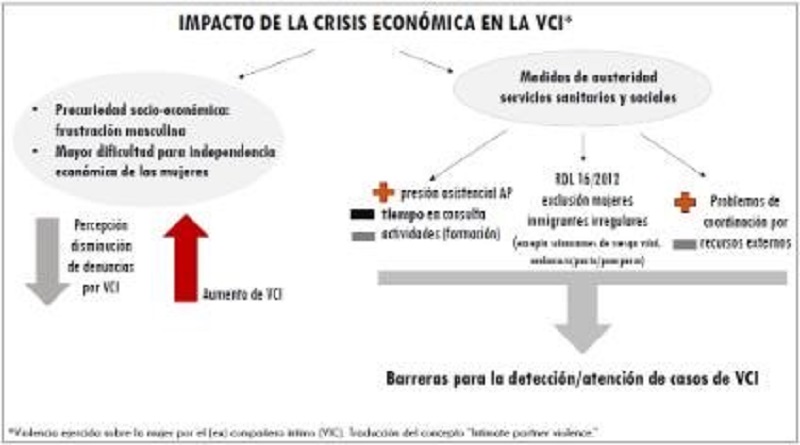
Cutbacks impair attention to victims of gender violence

2018-10-10
A study published in the European Journal of Public Health, led by a lecturer at the Autonomous University in Madrid (UAM) and the CIBER for Epidemiology and Public Health (CIBERESP), concludes that, in the context of the economic crisis in Spain, the austerity measures adopted have represented an obstacle for the public health services to cope adequately with gender violence.
A study published by Laura Otero-García, a lecturer and researcher at the Autonomous University in Madrid (UAM) and the CIBER for Epidemiology and Public Health (CIBERESP), shows that the economic crisis and the austerity measures imposed have had a negative influence on the response to domestic violence provided by primary health care in Spain.
Specifically, the paper shows that the reduction in staffing levels at health centres has meant that healthcare professionals have to shorten consultation times even more, and they therefore encounter difficulties when dealing with complex problems like gender violence.
This research presents information showing that the resources for women needing assistance are becoming more and more scant. It also shows that violence can be aggravated as women’s economic dependency increases, as well as due to the loss of the traditional role of “breadwinner” among men affected by long-term unemployment.
In addition, this study based on in-depth interviews with primary health care professionals reveals that “the on-the-job-training needed to give an adequate response to partner violence is becoming more and more scant, and the excessive workload prevents them from attending the activities organized.”
This paper, published in the European Journal of Public Health, is authored by an international team of eight female researchers belonging to the UAM, the CIBERESP, the University of Lérida (UdL), the GESEC research group (UdL), the University of Alicante, the National Health School (ISCIII) and the University of Umeå (Sweden).
“This research has enabled light to be cast on how the shortcomings arising out of the cutbacks have been countermanded in part, with the motivation of health care professionals being fundamental for the response to domestic violence by the Public Health System,” they state.
Economy, cutbacks and gender violence
According to the authors, “our research confirms three aspects of the relationship between economic crisis – cutbacks – gender violence. First of all, in the context of the economic crisis in Spain, health care professionals perceive that there has been an increase in their workload and a loss of quality in the attention provided in primary health care, making it more difficult to detect domestic violence against women.”
“Secondly,” continue the authors, “the cutbacks hinder teamwork and impair the on-the-job training of professionals, and both these circumstances are obstacles for the appropriate handling of gender violence.”
“The third aspect,” they add, “has to do with the awareness-raising and training programmes for health care personnel, which are still necessary to improve and promote early diagnosis, prompt attention and rehabilitation for women exposed to domestic violence. The strategy at governmental level has to change, by providing more resources to the services that have to respond to the violence inflicted on women by their partners.”
The study presents the results of 145 interviews of primary health care professionals (109 women and 36 men) at 16 health centres in 4 different regions.
This is an independent research study conducted under the umbrella of the project entitled How do primary health care teams learn to integrate intimate partner violence management in Spain, led by Isabel Goicolea Julián, lecturer and researcher at the University of Umeå (Sweden), and it has received the approval of the Ethics Committee of the University of Alicante and was financed by the European Union and the Swedish Council for Working Life and Social Research.
_____________________
Bibliographical reference:
Laura Otero-García; Erica Briones-Vozmediano; Carmen Vives-Cases; Marta García-Quinto; Belén Sanz-Barbero & Isabel Goicolea. “A qualitative study on primary health care responses to intimate partner violence during the economic crisis in Spain”. European Journal of Public Health. DOI: 10.1093/eurpub/cky095

